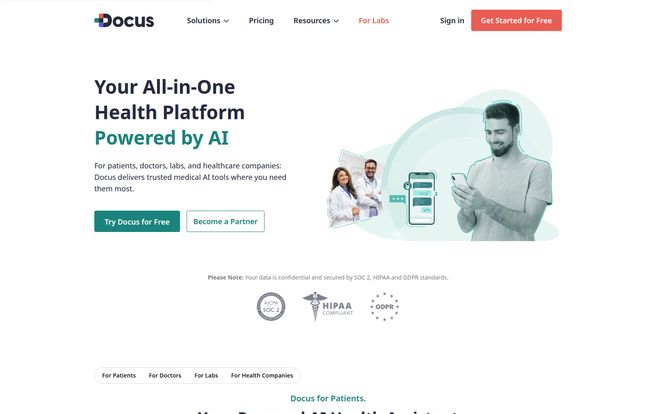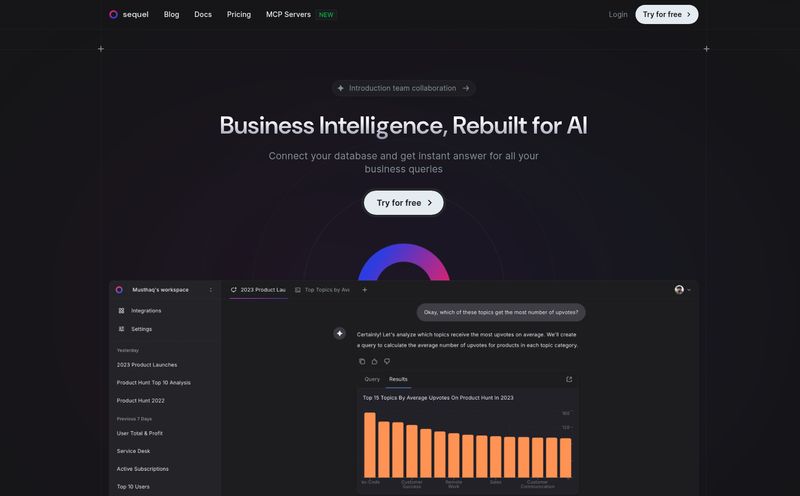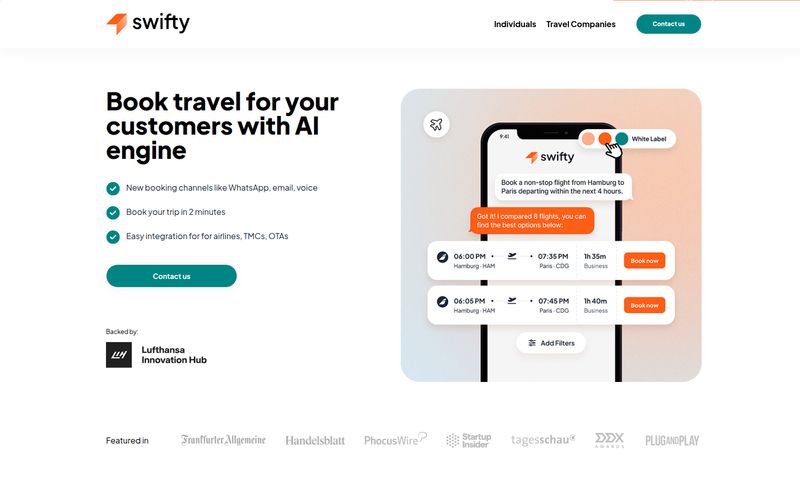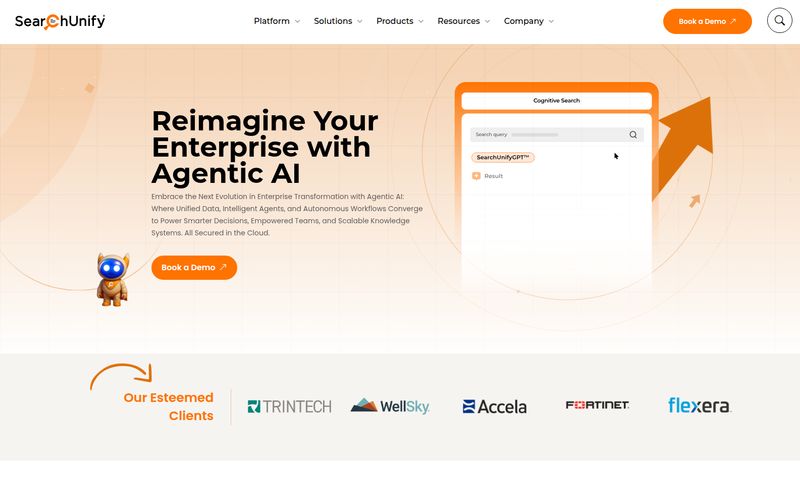We’ve all been there. It’s the middle of the night, you’ve got a weird twinge or a confusing lab report, and you fall down the rabbit hole of Googling your symptoms. Before you know it, you've diagnosed yourself with three separate rare diseases, and your anxiety is through the roof. The wait for an actual doctor's appointment can feel like an eternity.
As an SEO guy, I'm naturally skeptical of anything that promises to be the next big thing. The tech world is full of 'solutions' looking for a problem. So when I heard about Docus, an AI-powered health platform, my internal alarm bells started ringing. An AI Doctor? Really? But I also felt a flicker of genuine curiosity. Could this actually be… helpful?
I’ve spent years analyzing trends, and the intersection of AI and personal wellness is one of the hottest topics out there. So, I decided to put my professional hat on, push my skepticism aside (mostly), and see what this thing is all about.
So, What is Docus, Really?
First off, let's clear something up. Docus isn’t trying to replace your family doctor with a robot. Thank goodness. Instead, think of it as a super-smart medical assistant that lives in your phone or on your computer. It’s designed to be your first stop for health questions, a translator for complicated medical jargon, and a bridge to real, human experts when you need them most.
The platform is built on a pretty interesting premise: combine the immediate, data-crunching power of AI with the irreplaceable wisdom and experience of actual top-tier doctors. It analyzes your health data—symptoms you input, lab results you upload—and gives you AI-generated insights. But—and this is the important part—it always pushes you toward validating those insights with a real professional.
It’s less of a “Dr. Google” and more of a personal health concierge. A subtle but very important distinction.
Breaking Down the Docus Experience: Key Features I Tested
I messed around with the platform for a while, and a few features really stood out. It's not just one single tool; it's a collection of them that work together.
Your Personal AI Health Assistant
This is the core of the Docus experience. It's a chatbot, but a surprisingly sophisticated one. You can ask it anything from "Why does my knee click when I walk upstairs?" to "What do these terms on my blood panel mean?". The AI is available 24/7, which is a massive win for those late-night worries. I found its answers to be detailed and cautious, often suggesting potential causes without being alarmist and always recommending a follow-up with a doctor. It felt less like getting a diagnosis and more like having a productive conversation that helps you form the right questions to ask your doctor later.
Finally, Making Sense of Lab Results
This, for me, is the real showstopper. Have you ever gotten an email from a lab with a PDF attachment full of acronyms, numbers, and those scary 'HIGH' or 'LOW' flags? It’s awful. You're left in limbo, trying to decipher what 'Mean Corpuscular Hemoglobin Concentration' even is.
With Docus, you can upload that PDF directly. The AI scans the document, analyzes your biomarkers, and generates a detailed report in plain English. It explains what each marker means, why it might be out of range, and what lifestyle factors could be influencing it. This is incredibly empowering. It turns a document of pure anxiety into a tool for understanding your own body. It doesn't give you medical advice, but it gives you knowledge, and that's half the battle.
The Human Touch: Second Opinions from Top Docs
Here’s where Docus truly sets itself apart from a simple AI app. Let's say the AI report flags something, or you just have a serious diagnosis and want another expert to weigh in. Docus has a network of top doctors from the US and Europe available for second opinions. This isn't part of the regular subscription; it's a separate, premium service. And it's not cheap—we're talking $499 per consultation. But when you're facing a major health decision, getting a second look from a leading specialist can be priceless. This feature adds a serious layer of credibility to the whole platform. It shows they understand the limits of AI and the essential role of human expertise.
The All-Important Question: Docus Pricing
Okay, so how much does this futuristic health assistant cost? The pricing structure is actually pretty reasonable and flexible. They have a few tiers for individual patients.
There's a Free plan that's, well, free forever. It gives you a handful of messages with the AI doctor per week and lets you use the symptom checker and AI health report generator. For casual use or just trying it out, this is fantastic. No barrier to entry.
Then you move into the paid plans. The Lite plan is currently $3.99 a month (or a bit cheaper if you pay yearly) and gives you a much higher message limit (50/month). This is probably the sweet spot for someone who is actively tracking a condition or just wants more regular access. The Pro plan is a step up at $7.99 a month, offering a massive 500 messages, which seems geared towards power users or those with complex health situations requiring frequent check-ins.
Honestly, considering a single insurance co-pay can be $30-$50, paying a few bucks a month for this level of immediate information and peace of mind feels like a pretty good deal.
Can You Really Trust an AI With Your Health?
This is the big question, isn't it? My inner cynic was screaming this from the rooftops. Handing over sensitive health data to an AI? It feels... weird. However, Docus seems to take this very seriously. They are explicit about being HIPAA and GDPR compliant, which are the gold standards for data privacy in the US and Europe. Your data is encrypted and secure.
More importantly, the entire philosophy of the platform is built on the idea that AI is not a substitute for a doctor. I saw this message repeated everywhere. The AI is a tool for information and preparation. It's there to help you have a better, more informed conversation with your healthcare provider. The AI insights are, as one of their featured doctors put it, “curated with clinical experience.” It’s a starting point, not the final word. And that's a philosophy I can get behind.
So, Who Is Docus For?
After playing around with it, I can see a few groups of people who would get immense value from Docus.
- The Proactive Patient: You're someone who likes to be involved in your healthcare, track your data, and understand the 'why' behind your doctor's advice.
- The Chronically Ill: If you're managing a long-term condition, having a 24/7 resource to ask questions and track symptoms between appointments could be a lifesaver.
- The Anxious Googler: Instead of spiraling down a WebMD rabbit hole, you can get structured, less alarmist information from a dedicated AI.
- The Busy Professional: You don't have time to wait three weeks for an appointment just to ask a simple question. Docus can provide that first line of inquiry.
My Final Thoughts on Docus
I came into this review expecting a gimmick. I'm walking away… impressed. Docus isn't the sci-fi AI doctor that diagnoses and treats you. It’s something more practical and, frankly, more useful. It's a powerful tool for patient empowerment. It helps demystify medicine, reduces anxiety, and prepares you to be a better advocate for your own health.
The future of healthcare won’t be about choosing between a human or an AI. It will be about how they work together. Docus seems to understand this better than most. It’s not perfect, and you should never, ever use it to replace professional medical advice. But as a companion on your health journey? It’s one of the most interesting tools I've seen in a long time.
Frequently Asked Questions
Can Docus AI replace my regular doctor?
Absolutely not. Docus makes it very clear that it is an informational tool and a health assistant, not a medical provider. It's designed to support your relationship with your doctor, not replace it.
Is my personal health data safe with Docus?
Docus states that it is HIPAA and GDPR compliant, using high-level encryption and security protocols to protect user data. This is a top priority for any legitimate health tech platform.
How much does a real doctor's second opinion cost on Docus?
The second opinion service is separate from the monthly subscription plans. Each consultation with a top specialist from their network costs $499.
Is there a free version of Docus to try?
Yes, Docus offers a "Free Forever" plan which includes a limited number of AI interactions per week. It's a great way to test the platform's core features without any commitment.
What kind of lab tests can the AI analyze?
The AI can interpret a wide range of health records and test results, including blood panels, biomarker reports, and other standard lab documents. You simply upload the file, and the AI generates an easy-to-understand report.
Who are the doctors that provide second opinions?
Docus partners with a network of highly-vetted, top-rated medical specialists from leading institutions across the United States and Europe, covering over 30 different specialties.
References and Sources
- Docus Official Website
- Docus Patient Pricing Page
- About the Health Insurance Portability and Accountability Act (HIPAA)




